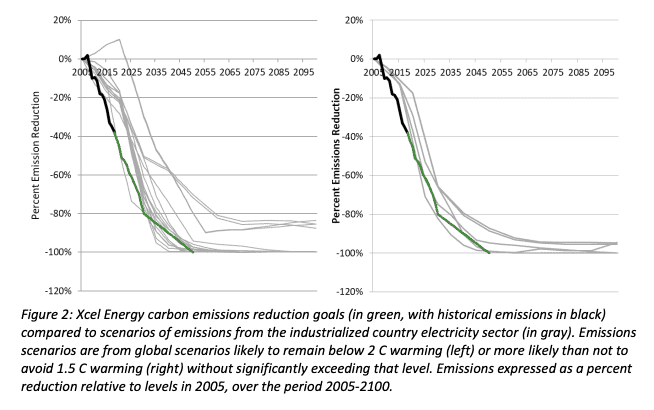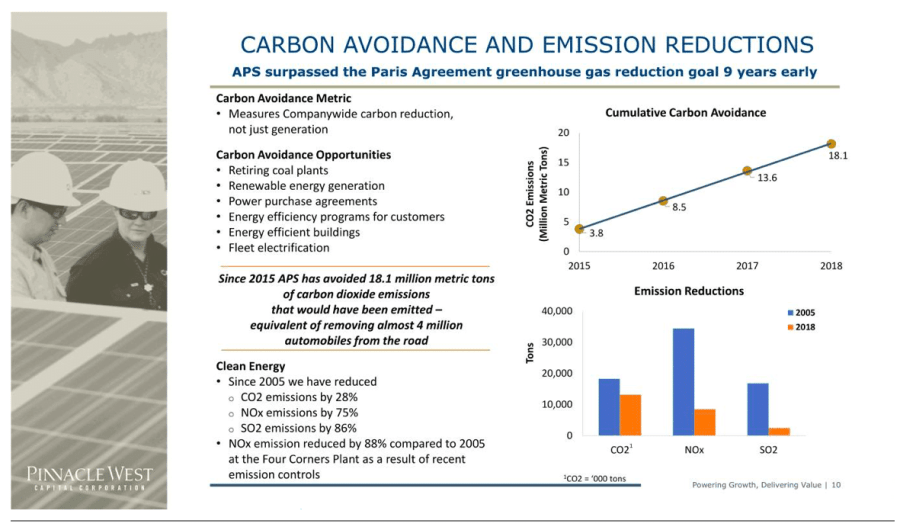Pinnacle West misleads investors that APS has “surpassed the Paris Agreement”

Arizona’s largest investor-owned utility is telling shareholders that it has “surpassed the Paris Agreement” – even though the company has not established a goal to reduce its total carbon emissions, unlike most of its peer utilities. Misleading claims like Pinnacle West’s could undermine major investors’ confidence in electric utilities’ Environmental, Social, and Governance [ESG] commitments, as the sector’s decarbonization goals face increased scrutiny.
In a presentation for investors last week, Arizona Public Service Company’s parent company, Pinnacle West, made an extraordinary claim: “APS surpassed the Paris Agreement greenhouse gas reduction goal 9 years early.”

Pinnacle West’s claim appears to be based on a comparison of APS’ 28% reductions of its own carbon emissions since 2005, and the United States’ commitment to reduce economy-wide emissions 28% below 2005 levels by 2025.
The Paris Agreement, however, goes well beyond those near-term national commitments to reduce carbon emissions. The central aim of the global climate agreement is to keep global average temperature rise well below 2 degrees Celsius, and aim for no more than 1.5 degrees of warming.
That goal will require electric utilities to fully decarbonize their operations by no later than 2050 in any scenario, a reality that is well understood by several major investors. In February, a group of pension fund managers and other institutional investors that manage $1.8 trillion in assets called on major electric utilities to develop “a detailed transition plan toward achieving net-zero emissions by 2050 (or earlier target), with clear near-term benchmarks and plans for 2025 and 2030.”
Those institutional investors explained their focus on electric utilities: “Decarbonizing electricity generation is the lynchpin to broader decarbonization of the economy, empowering other sectors such as transportation to convert to emissions-free models. Therefore, establishing a net-zero carbon emissions target for electricity by 2050 at the latest must be the centerpiece of any plan to meet the goals of the 2015 Paris Agreement in terms of constraining global warming to well below 2 degrees.”
Xcel Energy decarbonization plan includes 80% cut in carbon emissions by 2030
When Xcel Energy, an electric utility with customers in Colorado, New Mexico, Texas, and the upper Midwest, developed its carbon reduction plan, the company asked climate modelers from the University of Denver to compare its goals to the Paris climate targets.
In a report, Xcel Energy said those researchers found that “Our goal to reduce carbon emissions 80 percent by 2030 and aspiration to serve customers with carbon-free electricity by 2050 appear largely consistent with the industrialized country electric sector carbon reductions in scenarios that achieve the Paris climate targets.”
As the climate modelers’ analysis shows, Xcel Energy’s plan for significant emissions reductions over the next decade, along with full decarbonization by 2050, are key components of the company’s plan to align its business with the Paris Agreement goals.

APS has not set a goal to decarbonize – or even to reduce total carbon emissions
In addition to Xcel Energy, other electric utilities in the western United States have also recently announced decarbonization plans. In March, Idaho Power announced that it had “set a goal to provide 100-percent clean energy by 2045.” In April, New Mexico’s largest electric utility, PNM, announced that it had “set a goal of ensuring all our electricity is 100-percent emissions-free by 2040.”
In contrast, APS has not set a goal to decarbonize its operations – or even any goal to reduce its total emissions. Pinnacle West’s investor presentation says the company plans “to reduce carbon intensity by 23% over the next 15 years.” Carbon intensity goals mean that the company plans to emit less carbon per unit of electricity it sells, which is not a commitment to reduce total emissions at any particular pace.
That lack of a total emissions reduction goal is unusual among major electric utilities. An Energy and Policy Institute analysis of 22 of the top investor-owned electric utilities’ carbon targets found that Pinnacle West is one of only five that have not established any decarbonization goals for 2030.
Without the guidance of a decarbonization plan, APS proposed building thousands of megawatts of new gas plants in its last Integrated Resource Plan [IRP]. The Arizona Corporation Commission refused to accept that plan, and instead moved to require utilities in Arizona to consider energy storage projects before pursuing new gas plants. This week, the Commission will consider updating its resource planning rules, including a discussion about extending its moratorium on new gas plants. APS filed a preliminary IRP last month that emphasizes its clean energy plans, while also foreshadowing that the company would continue to pursue more gas-fired power as well.
Misleading claims could undermine investor confidence in utilities’ climate goals
In addition to Pinnacle West’s claims about the Paris Agreement, Southern Company has also made misleading claims about its emissions reduction goals.
Those misleading claims come as major investors pay closer attention to the ways that companies are aligning their businesses to climate change. An internal briefing from the Edison Electric Institute, the trade association for investor-owned electric utilities, explained that “Investors are increasingly interested in the risks associated with climate change.”
But that briefing also highlighted that investors “have a lack of confidence in ESG [Environmental, Social, and Governance] reporting from corporates.”



